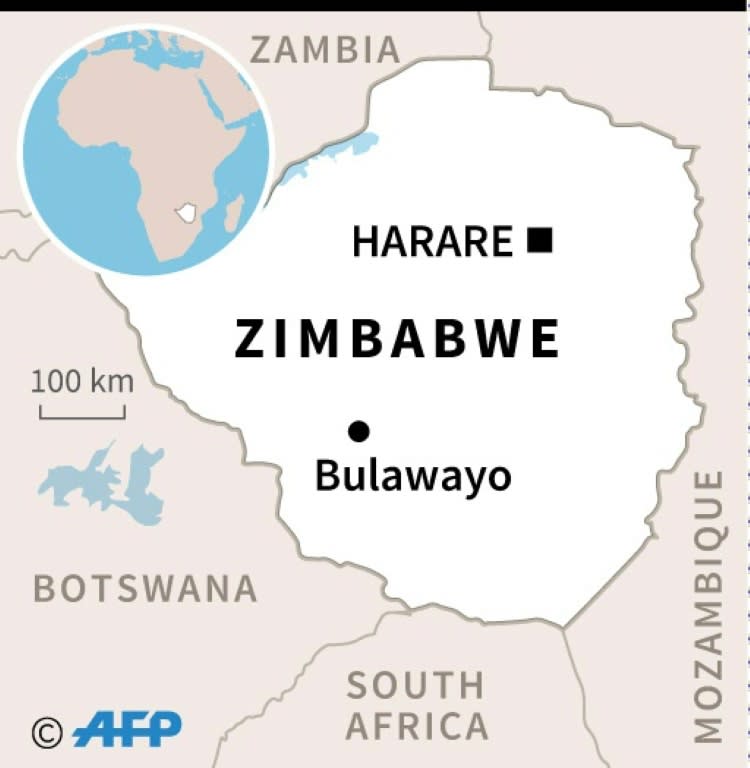Top Zimbabwe activist arrested in protest crackdown
Leading Zimbabwean activist Evan Mawarire was arrested by armed police at his home in Harare on Wednesday in a widening security crackdown after violent anti-government protests. The nationwide protests were triggered by President Emmerson Mnangagwa's move to double fuel prices at the weekend as the country's economic crisis deepens. "Armed police surrounded his residence," his sister Teldah Mawarire told AFP. "I was directly in contact with him until he was taken and he could no longer be online. We are very concerned." Mawarire's lawyer Beatrice Mtetwa told reporters he had been taken to a city centre police station. "He has been arrested, accused of inciting violence through social media," she told AFP. A wave of protest erupted on Monday, prompting a security crackdown in which at least five people were shot dead, Human Rights Watch said. HRW said security forces responded with live ammunition, rubber bullets and teargas after protesters set fire to a police station, barricaded roads and looted shops in Harare and two smaller cities, Kadoma and Bulawayo. Mnangagwa, 76, on Wednesday denied security forces had been heavy-handed in their response. The president, currently on a trip to Russia, told state broadcaster ZBC, no leader could "have their security go to sleep when shops are being looted... people are being stopped, they (protesters) are burning tyres to stop people from going to work." "And then you have people focus on the efforts to bring law and order, (instead of) focus on those who are breaking law and order in the country," accusing such critics of "warped thinking". - President calls for calm - Mnangagwa earlier tweeted from Russia: "I call for calm and peace from all of our brothers and sisters." But many Zimbabweans could not see the message as the country's mobile phone networks and the internet were only partially operating after being fully shut down on Tuesday. Police and soldiers have been accused of indiscriminately dragging people from their houses in Harare and beating them. State security Minister Owen Ncube said more than 600 people had been arrested in connection with "riotous acts". About 70 appeared in court in Harare on Wednesday when they were remanded in custody. Mawarire, a pastor, became a prominent voice during the protests of 2016 when he posted videos on social media criticising the government while wearing a Zimbabwean flag around his neck. His posts inspired the ThisFlag movement that led mass protests against Robert Mugabe, the long-time president who was ousted in 2017 after a military takeover. Mawarire, who was holding a Zimbabwean flag as he was taken away on Wednesday, has also been a fierce critic of Mnangagwa, Mugabe's successor. Mnangagwa -- Mugabe's former deputy -- has claimed he represents a fresh start and has vowed to revive the shattered economy by attracting foreign investment. But since his disputed election victory in July, the country has been hit by renewed shortages of fuel, bread, medicine and other daily essentials. - 'Unsolvable economic mess' - "Mnangagwa was not able to engineer any sort of economic recovery, so he hasn't been able to open up political space," Derek Matyszak, a Harare-based analyst at the Institute for Security Studies, told AFP. "Investment he was hoping for has not materialised. The economic mess is unsolvable in the short term, so the administration is reacting in the way ZANU-PF knows best -- with a very heavy hand. "The biggest signal of the return of repressive policies of Mugabe is the shutdown of internet. They obviously have no qualms about how the international community sees them." Zimbabwe's economy has been in ruins since hyperinflation wiped out savings between 2007 and 2009, when the Zimbabwean dollar was abandoned in favour of the US dollar. Official inflation is at 31 percent though many say the real rate is far higher. Long queues lasting hours or even days form outside petrol stations and banks, where both fuel and cash are rationed. With US dollar notes scarce, Zimbabweans are forced to withdraw "bond notes" -- supposedly equal to US dollars but worth far less in reality. Mugabe, now 94, was ousted in November 2017 when the military, fearing that his wife Grace was being lined up to succeed him, seized control and forced him to resign.



